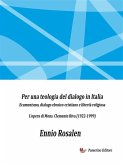The Rule of Saint Benedict (Latin: Regula Sancti Benedicti) is a book of precepts written in 516 by Benedict of Nursia for monks living communally under the authority of an abbot. The spirit of Saint Benedict's Rule is summed up in the motto of the Benedictine Confederation: pax ("peace") and the traditional ora et labora ("pray and work"). Compared to other precepts, the Rule provides a moderate path between individual zeal and formulaic institutionalism; because of this middle ground it has been widely popular. Benedict's concerns were the needs of monks in a community environment: namely, to establish due order, to foster an understanding of the relational nature of human beings, and to provide a spiritual father to support and strengthen the individual's ascetic effort and the spiritual growth that is required for the fulfillment of the human vocation, theosis. Benedict of Nursia (March 480 - March 547 AD) is a Catholic saint venerated in the Catholic Church, the Eastern Orthodox Church, the Oriental Orthodox Churches, the Anglican Communion and Old Catholic Churches. He is a patron saint of Europe. Translated from the Latin by Leonard J. Doyle
Dieser Download kann aus rechtlichen Gründen nur mit Rechnungsadresse in A, B, BG, CY, CZ, D, DK, EW, E, FIN, F, GR, HR, H, IRL, I, LT, L, LR, M, NL, PL, P, R, S, SLO, SK ausgeliefert werden.









